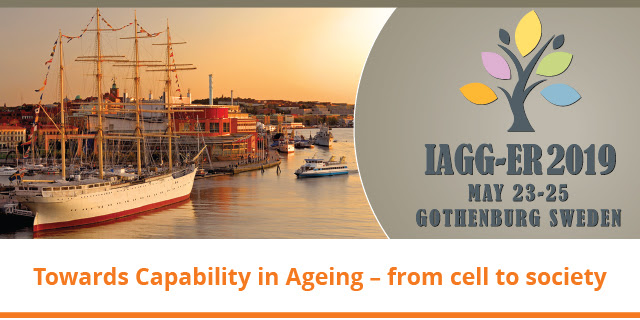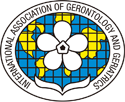the 9th IAGG-ER Congress
May 23-25, 2019
Don’t forget to
AgeCap – Centre for Ageing and Health
Get to know the organizer of the 9th IAGG-ER Congress May 23-25, 2019:
AgeCap – Multidisciplinary research for capable ageing
AgeCap is a research centre at the University of Gothenburg that is supported by FORTE and the University.
AgeCap started in 2014 with a cooperation between five research groups from different disciplines. In 2016 our centre was extended from three to six faculties, and from 5 to 14 departments through the University UGOT Challenges initiative. AgeCap now include researchers from 25 disciplines ranging from Neurochemistry to Design and crafts.
Our research is based on the perception that today’s society is not optimal for older persons’ health and wellbeing. While there are several ways to meet this challenge, AgeCap has chosen the capability approach to focus on a more health and ability-related perspective rather than on disease and disabilities.
Our definition of capability – the individual’s ability to perform actions in order to reach goals he or she has reason to value – originate from the philosopher and economist Amartya Sen. Capabilty in ageing depends on factors from the individual to the societal level and our multidisciplinary setting is a presumption for our research. We strive together to reach our ultimate goal; to enable and enhance capability during ageing to contribute to increased quality of life and societal participation.
Research groups in AgeCap
Originally, AgeCap was a collaboration between five research groups, which are symbolized by the various leaves in our symbol the aok tree. After funding from the University of Gothenburg’s initiative, UGOT Challenge in 2016, the centre was expanded to include researchers from five faculties and 15 institutions. We now conduct research on ageing and health within and between more than 20 different disciplines.
Our research groups and their research focus within AgeCap are presented below. Note that all projects within AgeCap are multidisciplinary, and researchers from different groups cooperate within the described areas.
NEUROCHEM
studies biomarkers for various processes in the brain in order to examine the biochemical effect of new drugs and to study brain diseases such as Alzheimer’s disease.
website for NEUROCHEM
LEXLIV
studies factors that affect individuals’ ability to have a long working life, and analyses the welfare implications of the generally more flexible and postponed age of retirement.
website for LEXLIV
FRESH
studies the concept of frailty in relation to older persons capability, and the impact that inter-professional and multidimensional interventions have on the potential to age well at home.
website for FRESH
ADA-Gero
has a multidisciplinary approach in studying ageing and development of older adults where genetic-, health- and socio-cultural factors are related to cognitive and emotional health.
website for ADA-Gero
EPINEP
studies the interaction between age, secular trends, dementia, psychiatric and somatic illnesses, functional disability, neurobiology and genetics, primarily in the Gothenburg Population Studies.
website for EPINEP
AGEDEM
Contains researchers from journalism, media and communication, political science, and law, who study different aspects of ageing from social science perspectives. For example, older persons and media, such as, digital divisions and the media image of older persons, consequences of ageing for democracy, and law and its interaction with older persons capability is studies.
Contact: Maria Edström, maria.edstrom@gu.se
Occupational and Environmental Medicine
Study the role that the work place has for persons to remain working up to higher ages, and which factors that contribute to the individual continuing his work after the age of 62.
Contact: Kjell Torén, kjell.toren@amm.gu.se
Cellular Aging and Protein Quality Control
Study relationships between protein quality control, ageing and neurodegenerative diseases.
Contact: David Öling, david.oling@gu.se
Ageing and society
Study continuity and change related to living conditions of older persons in a historical perspective.
Contact: Ulrika Lagerlöf Nilsson, ulrika.lagerlof.nilsson@history.gu.se
Natural Language Processing
Study linguistic symptoms and early cognitive decline as well as health literacy, capability and decision-making among older persons.
Contact: Dimitrios Kokkinakis, dimitrios.kokkinakis@svenska.gu.se
Health Economics
Study for example the role that early life conditions has on health outcomes during the life course, and how an individual´s health status may affect the health of close relatives.
Contact: Kristian Bolin, kristian.bolin@gu.se
Design Management
Study the relationship between older persons and healthcare providers in order to understand how we can increase older persons’ capability to have a good social life.
Contact: Ulf Dalnäs, ulf.dalnas@hdk.gu.se
Please help us to announce the congress wherever you are! Keep following us on the homepage iagger2019.se
The IAGG-ER offers sponsors and exhibitors excellent opportunities to present and share their messages to congress participants, read more here










